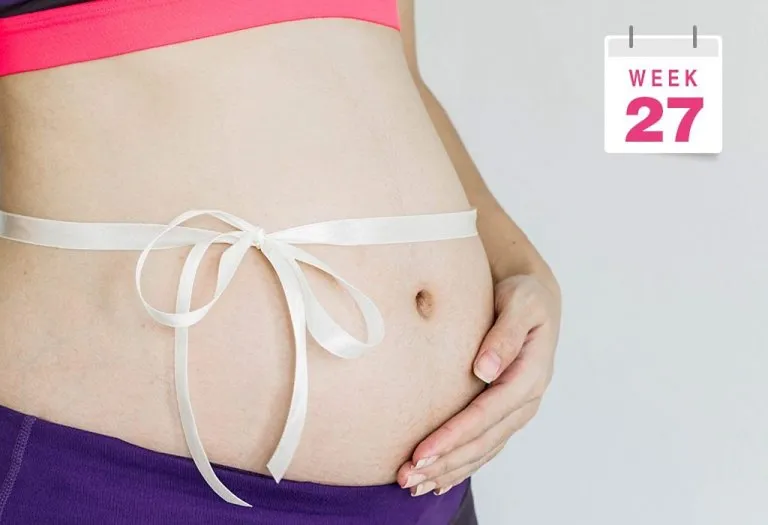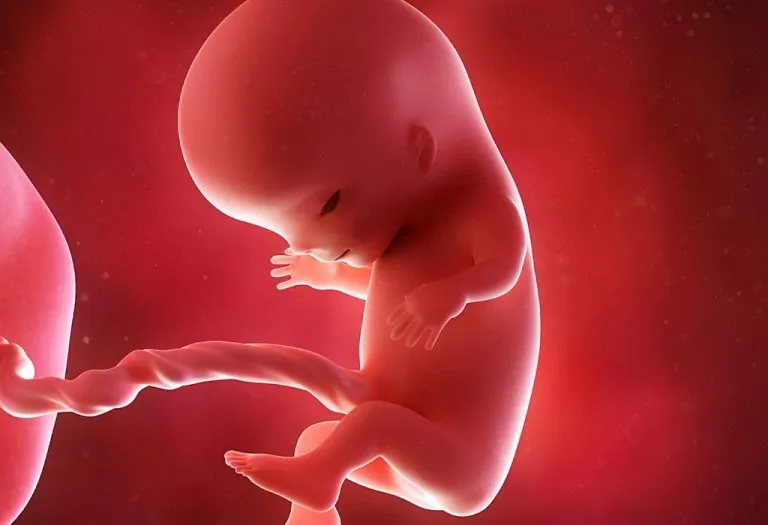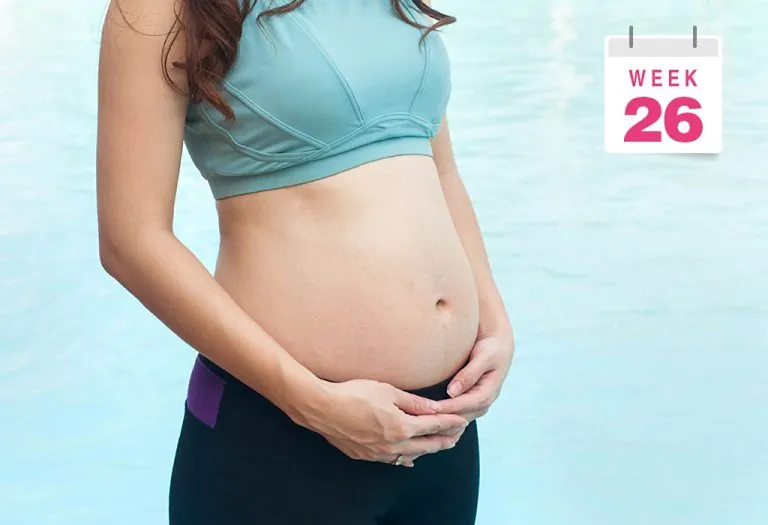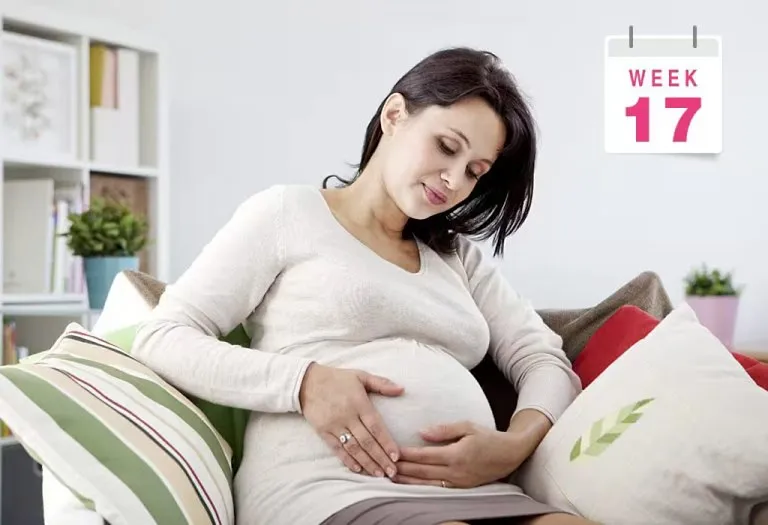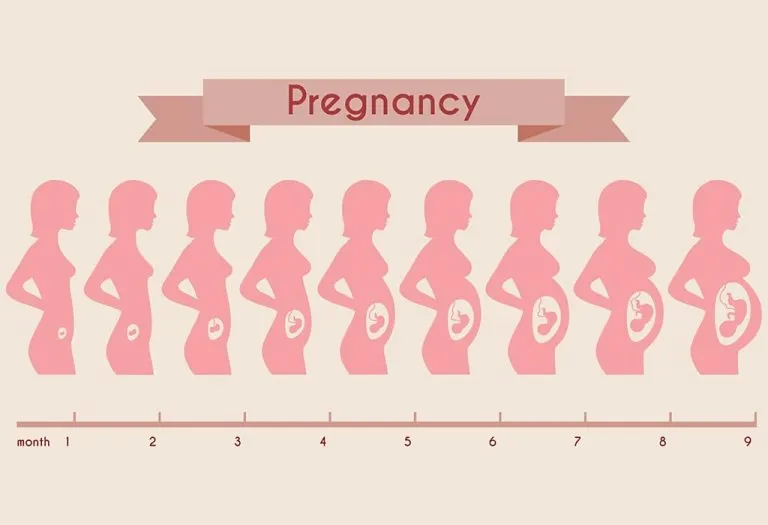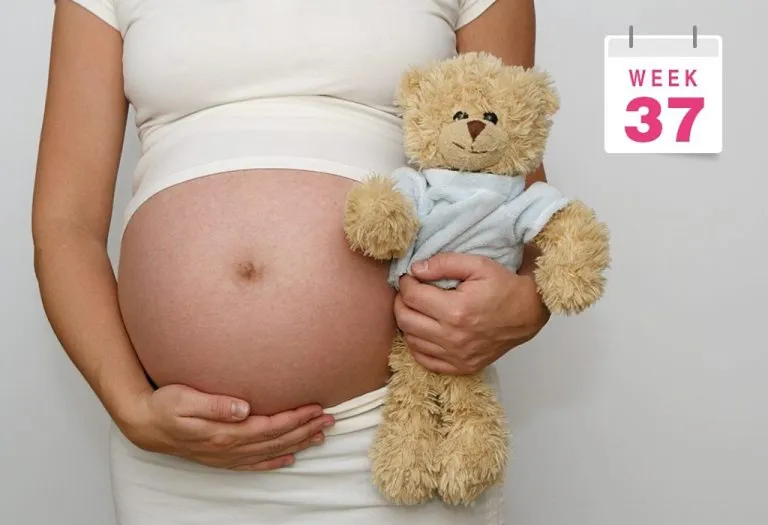27 Weeks Pregnant: Symptoms, Baby Development and Care Tips
- Your Baby’s Growth During Pregnancy – Week 27
- What Is Baby’s Size?
- 27 Weeks of Pregnancy Is How Many Months?
- Common Body Changes
- Symptoms of Pregnancy at Week 27
- Belly at 27 Weeks of Pregnancy
- 27 Weeks Pregnant With Twins
- 27th Week Ultrasound
- What to Eat
- Tips & Care
- What You Need to Shop For
- When to Consult the Doctor
- FAQs
Reaching twenty-seven weeks of pregnancy is a significant milestone as you transition from the second trimester toward your final months. During the 27th week of pregnancy, your baby’s head measures about the size of a head of lettuce or cauliflower. Your little one is now growing faster than ever, actively accumulating fat tissue beneath their skin, which appears much smoother than in previous weeks.
At the end of the 2nd trimester, your baby’s silhouette is clearly defined during ultrasounds, and you’ll likely notice more pronounced movements as they grow stronger (1). While no one plans for premature labour, the good news is that babies born at this stage have an 85% chance of survival, though some medical assistance may still be required for breathing and feeding support as their lungs continue developing.
Your Baby’s Growth During Pregnancy – Week 27
There are quite a few developments in the baby by the 27th week of pregnancy, like (2):
- The baby will be opening her eyes, and their eyelashes will have formed.
- The baby’s immune system, lungs, and liver are growing rapidly, but aren’t fully formed yet.
- The baby will start practising breathing movements even though they are still in the amniotic sac.
- The baby may recognise the mother’s or father’s voices, but the sounds may come muffled as the ears are covered in vernix coating.
- Babies have about 15% fat on their bodies at this stage, which will grow to 30% by the time they are born.
- The baby’s heartbeat would have become strong by now and can be heard through the baby’s bump.
Each of the baby’s movements during this phase lasts for a few seconds, and it is essential for you to relax and enjoy each of them.
What Is Baby’s Size?
Wondering what the weight of a fetus at 27 weeks is? The baby’s size at 27 weeks is about 35 cm, and they may weigh around 800 grams to 1 kilogram. The baby is able to distinguish between night and day, and the brain is also at the final stage of development (3).
During this time, you will notice that the baby is developing its own sleeping patterns. This is a normal thing, and doctors suggest that your resting schedule should coincide with your baby’s as much as possible. Please note that this is not necessary, but only when fetal movements need to be monitored.
27 Weeks of Pregnancy Is How Many Months?
At 27 weeks pregnant, you’re about 6 months and 1 week into your pregnancy, which means you’ve just entered the third trimester. Since full-term pregnancy is calculated as 40 weeks (roughly 9 months), you’re now in your 7th month with approximately 13 weeks remaining until your due date.
Common Body Changes
The body changes during the third trimester of pregnancy are aimed at preparing for labour and delivery (4).
- Oedema: During this time, apart from your belly size increasing, you will experience swelling in the ankles, feet and hands. This condition is known as oedema and is caused by fluid retention in the body. Fluid retention is caused by increased blood flow and uterine pressure. In case of excessive swelling, you should consult your doctor as this may be due to a condition called preeclampsia. To get relief from swelling, you should avoid standing or sitting for long durations. You may try to do some appropriate exercise, like yoga or swimming. This condition is temporary in nature and will go away completely once the baby is born.
- Itchiness: Your skin may be stretched to its limit, causing it to itch.
- Stretch marks: You may see some stretch marks that are pink or purple lines that develop in areas like the tummy, breast, and thighs.
- Dry Skin: You should avoid showering in too hot water because it may dry your skin.
- Exhaustion: You may feel tired all the time. However, once you try to sleep, you may find it difficult.

Symptoms of Pregnancy at Week 27
By the 27th week, your baby will have become large enough for you to feel her movements. Some of the common symptoms that women feel during the 27th week of pregnancy are (5):
- Breathlessness: As the uterus grows, it puts pressure on your upper chest, due to which you may have breathing problems (shortness of breath).
- Exhaustion – You may feel mental and physical fatigue because of the changes happening in your body.
- Pelvic pressure and pain in the lower back – You may experience cramping in the abdomen due to the increased weight of the uterus.
- Vaginal discharge – There may be an increase or change in the vaginal discharge which may be watery.
- Severe abdominal pain and tenderness – The growing belly may feel sore and tender sometimes. However, there should not be any severe abdominal pain or tenderness. If it happens, you should go to the doctor immediately.
- Pain or burning during urination – Lack of water in the body or urinary tract infection (UTI) may cause pain or burning during urination.
- Braxton Hicks contractions – Also called false labour, these contractions prepare the muscles of the abdomen for labour (6).
- Swelling or puffiness in the face, ankles, feet, and weight gain – These are symptoms of Oedema, a condition where the body retains water.
- Breathing problem – The strain on the lungs due to decreased space and increased need for oxygen may cause breathing problems.
- Constipation – As the space available for the digestive organs decreases, so does the efficiency of the digestive system, which may result in constipation. If it persists and leads to diarrhoea, then it is a matter of concern.
- Itching in the body – This is caused by the stretching of the skin.
- Cramping in the legs – The increased weight of the uterus impedes blood flow, leading to cramps.
- Blurry vision and headache: Experiencing headache and blurry vision during pregnancy is an imminent sign of seizures and should be checked by a doctor immediately.
These were some of the many 27-week pregnant symptoms.

Belly at 27 Weeks of Pregnancy
At 27 weeks pregnant, belly size typically measures about 26-28 cm from the pubic bone to the top of the uterus, showing a noticeable baby bump as your little one grows steadily. It is healthy to gain around 6 to 12 kilograms during this time. In case you have gained more weight too quickly, then it is advisable that you slow down a little. Since the baby has grown quite a bit, you could be experiencing the kicks and hiccups in the 27th week of pregnancy.
27 Weeks Pregnant With Twins
At 27 weeks pregnant with twins, you’re entering a crucial phase of your pregnancy. Your babies are growing rapidly, each now weighing about 2 pounds, while their organs continue maturing. Twin pregnancies require extra monitoring as you’re at higher risk for complications like preterm labor, gestational hypertension, and anemia. You’ll likely experience more intense symptoms – increased fatigue, stronger fetal movements, and possible Braxton Hicks contractions as your body works overtime. Doctors typically recommend more frequent prenatal visits at this stage to track both babies’ growth and your health. Most twin moms deliver between 32 and 37 weeks, making every extra week in utero valuable for your babies’ development.
27th Week Ultrasound
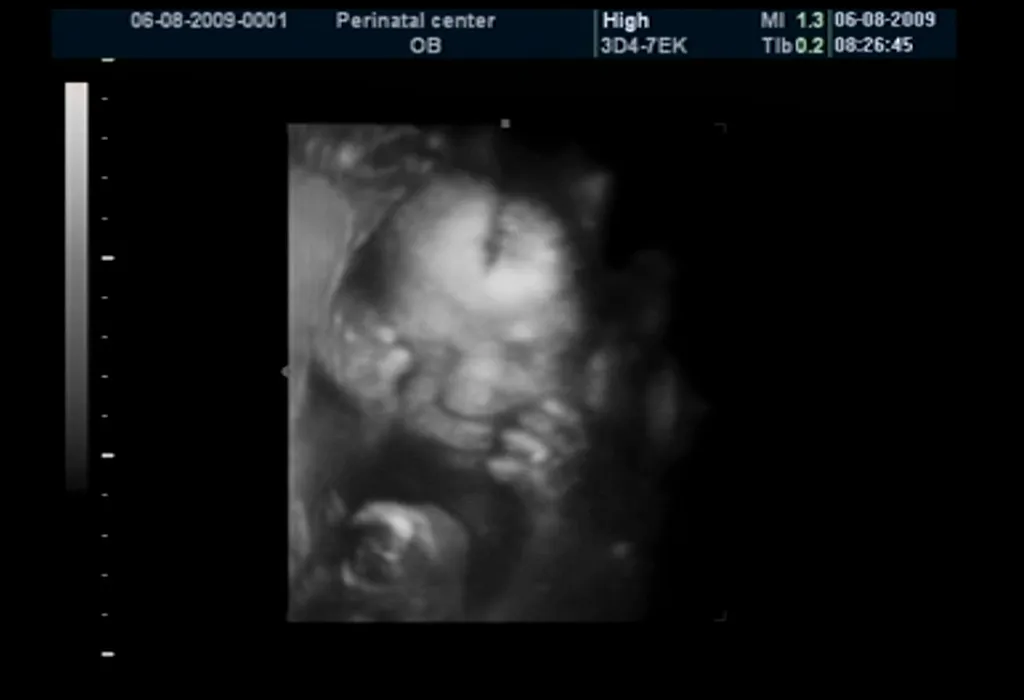
If your pregnancy is uncomplicated till now, then your doctor will advise a prenatal scan during the 27th week.
Your baby would have started to breathe, and her brain will also be active now.
What to Eat
You should continue to maintain a healthy diet to ensure that you and the baby get adequate nutrition. Here is a quick look at 27th-week pregnancy foods that are good for you:
- You should drink at least 12 glasses of fluid a day. This will prevent urinary tract infections and relieve constipation, which is common during pregnancy.
- Dairy products, green leafy vegetables, pulses, sesame seeds, almonds, walnuts, and figs are high sources of calcium and protein. Calcium and protein are helpful in developing the baby’s bones and teeth.

Tips & Care
Here are a few tips which are sure to help you take good care of yourself in this period (7).
Dos
- Staying healthy – You should maintain good health during pregnancy, the key to which is simply ensuring a nutrient-rich diet.
- Manage your diet – Eat healthy to ensure the growth and development of the baby.
- Hygiene – Maintaining personal hygiene by keeping the surroundings clean and developing good hygiene are extremely important in order to prevent infections.
- Exercise – You should do pelvic floor exercises and other prenatal exercises that are suitable for this phase of pregnancy. This helps you maintain weight and confidence, and reduce any discomfort that you may experience in pregnancy (like constipation, backache). Exercising makes the childbirth process smoother, too! However, you should always consult your doctor and exercise under a certified trainer.
- Sleeping position – Experts suggest sleeping on the less side during pregnancy, and especially in the second and third trimesters. Sleeping on the back can jeopardise the mother’s and baby’s health.
- Destress – You should stay away from stress and anxiety, as it may have an adverse physical impact on you.
Don’ts
- Avoid excess sugar and salt – Consuming too much sugar and salt may lead to gestational diabetes.
- Cut down on caffeine – Caffeine tends to dehydrate your body. Hence, you should avoid consuming it and shift to healthier options like green tea, which contains antioxidants.
- Rush – It is advisable to slow down as you tackle your daily tasks. Your increasing weight and the growing baby may make you unstable, increasing your chances of falls or injuries.
What You Need to Shop For
Since you are almost at the last phase of your pregnancy, you should start planning to shop for things you may require:
- Start shopping for accessories for the baby nursery and for baby furniture.
- Start shopping for things you will require at the hospital and at home, like nursing bras and nightwear. For jeans, you can opt for maternity jeans, which come with a band that stretches around the waist. You can go for these as soon as your regular jeans start getting snug. You can check out Bella Mama’s maternity track pants. They are super comfortable and convenient. For your baby, you can get baby clothes, a car seat, diapers, and wipes.

When to Consult the Doctor
While the second trimester is often the most comfortable phase, certain symptoms at 27 weeks require medical attention. Here are key situations when you should contact your doctor:
- Regular or painful contractions (could indicate preterm labor)
- Severe or persistent headaches
- Visual changes (blurred vision, light sensitivity, or flashing lights)
- Decreased fetal movement (fewer than 10 kicks in 2 hours)
- Vaginal bleeding or fluid leakage
- Sharp or constant abdominal pain
- Sudden swelling in hands, face, or feet
- Painful or burning urination (possible urinary tract infection)
- High fever (above 100.4°F/38°C) or chills
- Severe dizziness or shortness of breath
FAQs
1. Why do I feel rhythmic jerking in my belly?
At 27 weeks, you might notice subtle, repetitive twitches (like tiny pulses) lasting a few minutes. This is likely your baby having hiccups—a normal reflex as they practice breathing amniotic fluid. However, if paired with reduced movement or pain, consult your doctor.
2. Can pregnancy affect my sense of taste suddenly?
Some women experience dysgeusia (a metallic or bitter taste) due to hormonal shifts. Others crave ice, chalk, or non-food items (pica). Mention unusual cravings to your doctor, as they may signal nutritional deficiencies (like iron).
3. Is it normal to dream about labor or the baby?
Vivid, bizarre dreams are common now due to hormonal changes, anxiety, or disrupted sleep. Some research suggests they’re your brain’s way of processing impending motherhood—unless they cause extreme distress, they’re harmless.
Although this is one of the least important things right now, you may want to think about postpartum birth control. This might be a decision you want to take before the baby is born.
A pregnancy at 27 weeks gestation reaches an important milestone as the fetus becomes viable outside the womb with medical support. The 27th week is a great milestone for you and the baby, as it is the beginning of the final phase. There is a sense of excitement and happiness for the parents and grandparents as the due date approaches. Revel in the promise of joy that childbirth brings and equip yourself well enough to handle the temporary discomforts on the way.
References/Resources:
1. Unity Point Health – Pregnancy: What to Expect in Your Third Trimester (Week 27 – End of Pregnancy)
2. Nemours KidsHealth – Pregnancy Calendar: Week 27
3. American Pregnancy Association – 27 Weeks Pregnant
4. Pregnancy, Birth and Baby – Pregnancy at week 27
5. Mayo Clinic – 3rd trimester pregnancy: What to expect
6. Tommy’s – 27 weeks pregnant: baby’s development, your pelvic floor and trusting your instincts
Previous Week: 26 Weeks Pregnant
Next Week: 28 Weeks Pregnant
Was This Article Helpful?
Parenting is a huge responsibility, for you as a caregiver, but also for us as a parenting content platform. We understand that and take our responsibility of creating credible content seriously. FirstCry Parenting articles are written and published only after extensive research using factually sound references to deliver quality content that is accurate, validated by experts, and completely reliable. To understand how we go about creating content that is credible, read our editorial policy here.






